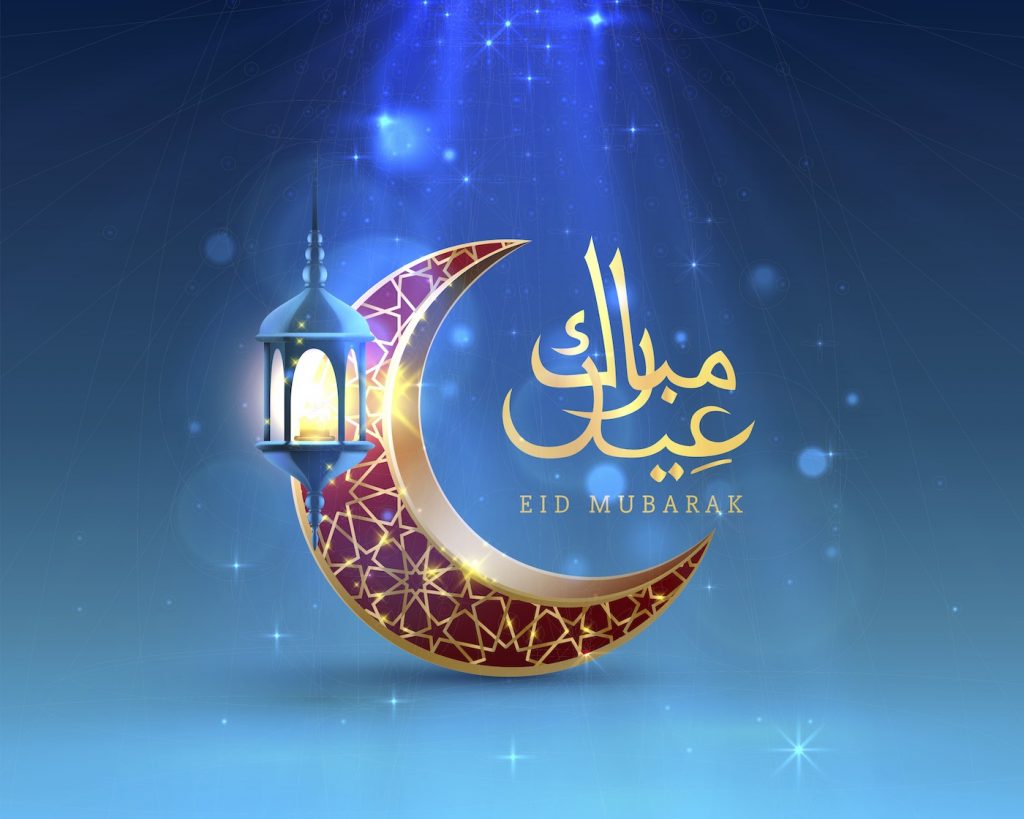
© Shutterstock
Tariq Mahmood, Toronto, Canada
Around the world, 1.9 billion Muslims celebrate the end of Ramadan, known as Eid-ul-Fitr. Eid marks the day Muslims stop their month-long fasting, which is a day of great jubilation and gratitude.
But what does Eid truly stand for? This holiday is not merely celebrating the cessation of fasting; it calls towards an altogether higher purpose. Eid is the celebration of all the progress a Muslim has made during Ramadan, especially spiritual progress.
So, how should Muslims make the most of Eid?
A Promise to Oneself
As Muslims leave Ramadan, they are spiritually super-charged; they’ve brought their A-game for an entire month. They pray more than normal and give to charity even more. Eid celebrates a pledge that Muslims should make between themselves and God: they will not lose their progress; in fact, they will build upon it.
The worldwide head of the Ahmadiyya Muslim Community, His Holiness Hazrat Mirza Masroor Ahmad (aba) explains this very point:
‘On this day, we ought to make a vow that we will continuously strive to fulfil the rights of Allah the Almighty along with the rights of humankind. It is only then that we will truly be commemorating Eid.’[1]
This is the first test of Eid: will it become a festival of food and lavish clothing, but devoid of faith and gratefulness? Of course, one is encouraged to wear the best clothes on Eid and apply perfume. It’s necessary to enjoy Eid, just as the Holy Prophet (sa) enjoyed it when he took his blessed wife to watch a display of swordsmanship.
However, the underlying purpose of Eid, the true foundation of it, is something even greater. It is to remember God with even greater conviction and to strive in righteousness with a stronger spirit. If Allah the Almighty intended for this day to be purely ceremonial, He certainly wouldn’t have added another prayer to it, but this is exactly what Muslims practice: an extra prayer to be offered on Eid.
Muslims around the world must make the conscious decision to build upon the version of themselves that they witnessed in Ramadan and carry those habits forward.
Muslims and non-Muslims alike can utilise Eid to ask themselves: have they made a pledge to be better? Do they have various goals in mind by which they can become better individuals? If they have done so, then they have passed the first test. The first hurdle of any goal is to set it, and then take small steps to complete it. This is the opportunity that Eid offers.
The Tough Decisions with Your Family
No one said having a family is easy. Everyone has ups and downs in family life, and with past wrongs and lack of awareness, it’s easy to get upset and cut off ties. That’s why Islam has placed such a heavy emphasis on maintaining family ties! The same applies to friendships.
His Holiness Hazrat Mirza Masroor Ahmad (aba) explains that one should show kindness even to those relatives who don’t reciprocate that kindness. He elucidates:
‘There is no condition which stipulates that one should only show kindness if those relatives also show kindness in return. In fact, even if they do not show the right attitude, one should show them kindness.
Once, a person asked the Holy Prophet (sa) what he should do if his relations continued to break ties with him and did not respond to him or treat him properly, despite him treating them well. The Holy Prophet (sa) stated, ‘If this is true, then you should maintain your conduct and treat them with kindness. This will be an act of benevolence on your part for them, and as long as you deal with them kindly, Allah the Almighty will continue to help you.’
Therefore, true satisfaction with Eid is acquired when one continues to treat one’s family and friends well, without seeking any reward or remuneration in return. Hence, for this reason, it has been commanded by Allah the Almighty and His Messenger (sa), and Allah the Almighty Himself grants reward for this.’[2]
Ask any Muslim, and they’ll narrate stories of families once distanced, brought together because of the celebration of Eid. Past mistakes are forgiven, siblings are reunited, and young relatives once more run around together in the park, not knowing why their parents kept them apart in the first place.
This is especially true for a spouse’s parents. His Holiness (aba) has also stated that many husbands don’t let their wives meet their families due to past grievances. These evils are rooted in arrogance and should be completely destroyed.[3] Islam commands Muslims to treat their spouse’s family with even more kindness.
Ramadan is a time of great humility; as Muslims constantly bow down to God and ask God to forgive their sins, they must acquire humility with respect to others and acknowledge their own weaknesses, thereby forgiving others for their shortcomings. Thus, Eid is the name of great humility; it is an acknowledgement that just as God has had mercy on humankind, they should have mercy on others and forgive them.
On this Eid, if any Muslim has decided not to meet particular relatives, they should re-evaluate whether their humility has brought any change at all! If human beings with all their diverse religions and ethnicities, were able to love just their own families, the world would undoubtedly be much safer and happier.
Giving Up What You Love In Order To Grow
A famous custom of Eid that is practised all around the world is Eidi (giving gifts or money to those younger than you). This practice seeks to create a loving atmosphere within a Muslim family. However, there is another avenue to make your Eid a true celebration of faith: give to those who are less fortunate.
According to the World Bank, 719 million people live on less than 2.15 USD daily, or 1.69 GBP. Hundreds of millions of people will only dream of having the Eid that Muslims in western nations have, where there is food on their table and their clothes are beautiful.
Ask Muslims who have lived in developing Muslim countries, and they’ll speak of the beggars who walk from house to house on Eid, receiving some small amount of money or food, and celebrating Eid in their own way.
How many people have considered that the Eid of these people will be spent in homelessness; that their meal on Eid will be one that western nations might eat every day, but they’ll be thankful for it? This should inspire every human, whether Muslim or not, to donate to the poor so that they may also celebrate.
These thoughts should motivate us to give to the poor, needy, and the orphans. His Holiness (aba) again reminds us:
‘Include orphans in the Eid celebrations…whilst directing our attention towards looking after the poor, Allah the Almighty states that a believer feeds orphans and the poor for the sake of attaining His pleasure. The Holy Prophet (sa) also stated, “If you wish to soften your heart, then feed the poor and place your hand on the head of an orphan.” Thus, in order to be granted the opportunity to perform this virtue and in order to attain the pleasure of Allah the Almighty, one ought to make this service to humanity incumbent upon themselves. They ought to be especially mindful of this on the occasion of Eid.’[4]
Thus, a true Eid is spent trying to help others as well. If Eid is a celebration of a Muslim’s righteousness, then it shouldn’t be restricted to mere lip service; their actions should demonstrate the change that took place within them during Ramadan.
The True Day of Eid
Ramadan is a spiritual endeavour, a time when Muslims learn whether they have truly reformed themselves. If Muslims become close to Allah the Almighty, they have completed their mission, and their happiness is warranted when Ramadan ends. If they don’t, then their Eid will not reflect the result that they achieved.
The founder of the Ahmadiyya Muslim Community, Hazrat Mirza Ghulam Ahmad (as) writes regarding Eid and its celebration:
‘Which day is that which is better and more blessed than the day of Jumma and the Eidain [two Eids]? I tell you that it is the day of a man’s repentance which is greater than all days and all Eids…The sinner who repents was previously far away from God’s grace and close to his wrath, but now he is brought close to God’s grace and mercy and removed from the punishment of fire.’[5]
A true Eid lies in marking this special day; the day that a person repents and decides to find/become closer to his or her Creator is worthy of genuine celebration. This would make a person’s entire life their Eid, and every day would be a jubilant reminder of their powerful friendship.
Alongside this, Eid is the name of recognising the rights humans owe to their fellow brothers and sisters. First and foremost among them are parents and family members, who deserve kindness and forgiveness far more than anyone else. Then, it is those to whom we as humans decide to be the giving hand: to the poor, the needy, the orphans, etc. In fact, Islam outlines that Muslims should discharge the rights of all groups of people in society.
Finally, a true Eid is a recognition of the rights that humans owe to themselves. Every human owes it to themselves to become the best version that they can be. For every person, Muslim or non-Muslim, this will be the mission of their life.
If every year’s Ramadan marks another step forward on this path, then humans have made the most of Ramadan. If they choose to be better, then every year will bring a true Eid.
Thus, every single person must make this crucial decision:
They know how to make the most of Eid and how to better themselves. Will they?
Endnotes:
[1] ‘Understanding the True Spirit of Eid’, Hazrat Mirza Masroor Ahmadaba, Delivered 2nd May, 2022, https://www.reviewofreligions.org/38537/understanding-the-true-spirit-of-eid/
[2] Ibid.
[3] Ibid.
[4] Ibid.
[5] Malfuzat, Vol. 4, pp. 114-115.




Add Comment